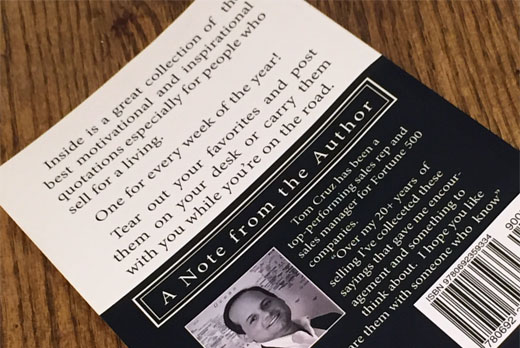My Takeaways From The Book 52 Motivational Quotations For Salespeople By Tom Cruz
We all sell. Whether the word “sales” is in our job title or not, we all “sell” in some regards. From persuading a solution at work to convincing someone to date us to everything in between and all around, there is some element of selling in our lives.
Where we can succeed in selling, many times we do not. And when we do not, we can react to it in any number of ways. Whether we like it or not, we have to try to sell again. For some, getting back into the proverbial saddle is easy, and for others or just other times, we may need help. One way to get that help is from words of encouragement.
My good friend Tom Cruz has had the word “sales” on his business cards over his entire career (and when I say good friend, I stood up in his wedding and once flew live lobsters out to his house in LA from Boston, but I digress). When I heard he wrote a book titled 52 Motivational Quotations for Salespeople, I knew I had to read it. Of course it is always to support a friend, bit I knew it would be a great collection and motivator as well.
Friend bias aside, I enjoyed this short book. Each quote is on a separate page, allowing you to tear them out and hang them up. As with any book, I had a few takeaways from it:
We need to find what works for us – Reading through a book of motivational quotes in itself won’t necessarily make it a better day. Or maybe it will. We have to find what works for us, though trial and error, and it may be a third-party sharing something with you.
Explore beyond words – We often hear names of people and quotes that have been attributed to them. But who are these people? Were they business or religious leaders? Were they ax murderers or musicians? Does the quote define them or just confuse you? As I went thru this book I ended up searching several names I did not know.
Write your story – Where these quotes are just that, individual sets of words from others, combined they are part of my friend Tom Cruz’s life journey, and thus tell part of his story. We all have a story to tell or at least record for curious others – now or in the future – whether our child or a stranger. No matter who, our story may be of interest to someone someday.
Note Tom did not ask me to write this, nor did he give me a copy of it. I will make sure to give him a signed copy of my future book someday! As I pass along book I read to others, I am sending this one to a common friend of both of ours, who also works in sales, and should publish his own book too.
Were you intrigued or inspired to get 52 Motivational Quotations for Salespeople? Have you thought of publishing your own quotes? I welcome your thoughts in the comments to this post.
This is from The Hot Iron, a journal on business and technology by Mike Maddaloni.
Did you enjoy this? Subscribe to The Hot Iron by RSS/XML feed or Read by Email.
Book Take-Aways • Business • Thrive • (0) Comments • Permalink
Most People Spend Most Of Their Time Around Their Job

It came to me a while back, something I guess I always knew subconsciously but only then came to the forefront of my mind – most people spend most of their time around their job. I then decided to put fingers to technology to see if I was right, and here’s my analysis and further thoughts on it.
Jobs and all their trappings
When thinking about how we spend our time, our jobs tend to be at the top of our list. This is of course assuming we don’t sleep most of our lives, but I digress. The job itself is the major time hoarder, assuming the typical 8-hour day. But if your day is anything but typical, it in itself is probably more than 8 hours, give or take a few minutes to a few hours.
As the TV infomercials say, “But wait, there’s more!” There’s the commute to work, both to and from it. You then need to prepare to go to work – wake up, shower (hopefully), eat and of course thinking about work. After work, there is probably some decompression, which involves more thought. If you work for the bare-minimum tech-savvy company, you can probably check your work email on your mobile device, and that adds up quickly, whether it is during the day or off-hours, including weekend. Then there's time devoted to things like doctor's appointments if things aren't so great on the job, but I don't have to go down that path here, do I?
Speaking of those off-hours and weekends, you are also thinking about work in addition to being connected to it. You may also be shopping for work, whether it is clothes, food or other supplies to get you through the day. And let’s face it, you may even take time after (or before) hours and on the weekends to actually do work, taking those time-consuming thoughts into even more time consuming actions.
So what’s your point Mike?
Now that I have set a somewhat somber point, you may be asking why? Why even bring this up?
Where I have thought about this very topic for a while, I wanted to write it out to make it real, tangible, and in my own face, and as a result in yours as well. By doing so, it is a realization that this will play into my upcoming goals for the new year. Where this time allotment towards my job may not be a direct or the primary input to my goals and decisions, but acknowledging it, I am realizing it will have some impact on it. From what I buy to where I live to what I do outside of work to whatever I may not have even thought of, the amount of time that my job currently occupies my time will come into consideration.
This time consumption perhaps consumes you as well – hopefully less, but perhaps even more. And let’s face it, it consumes most everyone. I say most everyone as I realize there are those who may not have to or want to work as much, and have the ability to disconnect from it. It may be because they are wealthy, live a simpler life, have a business or job that does not require as much of their time, work part-time but make enough to make them happy, or something else I couldn’t possibly fathom, but would love to.
Even if your job takes up most of your time, that may be ok, providing you love it, or maybe just a strong like. Or it’s convenient to where you live so your commute time is shorter. Or whatever it is or are, when you look at it written out, I hope you are at a minimum content with it.
The lay of the land
Now that I have painted the picture, do I (or you) want to hang it on the wall, or change it? I am not trying to draw any conclusions here – just simply putting it out as I said earlier, but reserving the right to refer to this in future writings.
I welcome your thoughts on this in the comments to this post… and please leave out any specifics about your job in those comments!
This is from The Hot Iron, a journal on business and technology by Mike Maddaloni.
Did you enjoy this? Subscribe to The Hot Iron by RSS/XML feed or Read by Email.
Blogging • Business • Diversions • Strategize • Thrive • (0) Comments • Permalink
All Progress Requires Change But Not All Change Is Progress

Recently a friend posed this question to me, “hey Mr. Blogger, answer this: all progress requires change, but not all change is progress.” Yes, asked me it in just like that, and they did not tell me why they were asking me or if the statement came from somewhere other than their own brain.
Needless to say, their question got me thinking. I really didn’t care about the source and why as much as the statement itself… so much that it compelled me to write this.
When I first heard this, 2 things came to mind. The first was a quote from the song “Freewill” by the band Rush, which goes, “if you choose not to decide, you still have made a choice.” Don’t ask me how this association was specifically made; I have always loved that line as it is one that frequently comes to mind when faced with a difficult situation or choice, or after I was and I may not have chosen or waited too long and options may have gone away.
The second thing that came to mind was the pure definitions of each word – progress and choice. Maybe it has something to do with growing up a few miles from the home of the original American dictionary. Where that is part of it, I always like to set my foundation from which to build a thought and idea from. According to Merriam-Webster, the definition of progress is movement forward or towards a place; the process of improving or developing something over a period of time. The word change is the act, process, or result of changing; an alteration, transformation, substitution. There is more depth to each definition and each word is linked to its full definition.
Gut reaction followed by reflection
Going into writing this, I agreed with the statement. I equate progress to forward motion and accomplishment, and change to something being a catalyst for it, though forward motion and accomplishment is not necessarily progress in itself. You can change your surroundings, but it doesn’t necessarily equate to progress in your life. Each one in themselves has tangible qualities, but only progress has the positive intangibles of pride and satisfaction. This speaks to why the organizers of the 1933-1934 Chicago’s World Fair likely nicknamed it “A Century of Progress” and not “A Century of Change.”
As I thought about this more, I found these 2 words – change and progress – need each other. In order to progress and move forward, you must act, evaluate and most likely change something in order to move forward. Whether it’s where you live, a job, a customer or whatever, many times doing what you did before to get you where you are won’t take you any further. That change doesn’t have to be monumental – it may just be a tweak – but something different is often needed.
Change in itself is always happening – whether the weather, people, etc. – and reacting to that change with appropriate actions – big or small – will lead to progress, not the mere change itself.
Of course this is how I interpret this statement today. In the future, with whatever happens in my life – and changes and progresses – will most likely have an impact on this analysis. At least for now, I hope this addresses my friend’s query. It has definitely adjusted my thinking as now I will be looking for progress in my life. It this statement impacted your thinking – or not – please share your thoughts in the comments to this post.
This is from The Hot Iron, a journal on business and technology by Mike Maddaloni.
Did you enjoy this? Subscribe to The Hot Iron by RSS/XML feed or Read by Email.
Business • Diversions • Strategize • (2) Comments • Permalink
Web Content Horror Stories For Halloween

Come gather children and adults, huddle by the flickering fire, sip on hot apple cider, all while I, in the shadowy light of the fire, tell stories this Halloween season – true stories, horror stories of Web site content!
The Scream
Many, many years ago I worked for a tech consulting firm that was undergoing rebranding. This exciting process was to include a new look to the Web site. As we were in the business of building Web sites, we were going to build out the ability to maintain the site as well. Note this was years before the term content management system, or CMS, was ever in vogue.
The project was assigned to myself and another senior guy I will call Rocky. There was a little bit of competitiveness between us, partly due to our own cockiness and confidence in our abilities, not to mention he was a Packers fan and I was a Patriots fan, but I digress. In some regards I think that's why both of us were put on the project. We would be building the technology, integrating the new branding and graphic design from the marketing firm and designing sample content, as the president of the company would be writing all of the content, as this is what he told us.
Despite our attitudes, Rocky and I worked very well together. We built out the front-end, back-end, database and sample “lorem ipsum” content. And we did it all on time.
Here's where the story gets scary... the president asked to meet with us at a predefined time in the project plan to review our progress. To his surprise – which quickly and surprising to us we saw on his face – we showed him a, for the most part, complete Web site. All it would need is a few small adjustments... and a lot of content.
Though we were in a brightly-lit office, the room got suddenly dark and eerie. The typically congenial voice of the president got heavy and creepy. Then, timed with a hypothetical clap of thunder, the screaming began.
As time and attempts to forget about this have clouded specifics, in general our frightening leader said, “how dare you finish on time when I didn't even start to write the content!” What? We were numb to the proverbial “second one” he was ripping into us, and it seemed like hours afterwards we were still stunned. Then, after he left, we laughed, hysterically, for what also seemed like hours.
The Original Blank Page
It was a work day like any other, multitasking away in and on my Web consulting business. A friendly chime sounded as my often co-collaborator and an amazing graphic designer n her own right – we'll cal her Sierra – called as we were partnering on a Web site proposal. It was mostly written, reviewing back and forth by email, and we were meeting to make a final walkthrough together before submitting it to the prospective client.
As we went through the proposal line-by-line, word-by-word, it was almost as if a light springy piano tune was playing in the background by none other than Liberace himself. As we got through the end of the document, where we listed references and example Web sites, we both paused as we were reviewing the list. Even though we were on the phone, over 1,500 miles apart, it was as if we were in the same room, pointing to the same spot in the document.
Just as Sierra began to say what I was thinking, it was as if Liberace was vaporized to dust and the Phantom of the Opera took over at the bench and with the flick of some switch, the piano became a pipe organ, and the Phantom played the most sinister music known. Then Sierra spoke, "THIS Web site... when was the last time you looked at it?” The silence over the phone was broken by more organ music, which was timed with each of us typing the Web site's URL into our Web browsers.
As we navigated beyond the home page the music got louder and more daunting, as we looked at empty page after empty page, with nothing on them at all – not one word of content! The shrieking in our voices was beyond our control. This Web site had been live for almost a year with several completely blank pages, to which we could not believe. My gut reaction took over, as I logged into the CMS for the site and placed some basic “coming soon” messages. There was no way we could use this great looking Web site with blank sub-pages as an example of the great work we did. Where the placeholder text was not the ideal situation, it was really all we could do, and in the end turned out to be sufficient as we won the proposal.
Only a Few of Many Stories
Over the years I have encountered Web content horror stories, almost from the time I started creating Web sites. I share these stories not to criticize people or to make fun of them, rather to serve as a cautionary tale of the importance of content development for Web sites. It is not something to do casually – or not at all – and is vital to the success of your site.
Boo!
This is from The Hot Iron, a journal on business and technology by Mike Maddaloni.
Did you enjoy this? Subscribe to The Hot Iron by RSS/XML feed or Read by Email.
Blogging • Build • Business • Strategize • Web Design • (0) Comments • Permalink
Top 7 Must-Have Features In A New Bank Account

I have always had a love/hate relationship with banks. Love too, you say? Yes, as I worked through most of college at banks, doing everything from check processing to mortgage collections, I gained insight and appreciation for how banks operate. Hate, as most people do, for as consumers we feel banks are not on our side and are just trying to slap fees on us and make it hard to access our money, among other choice topics I am sure.
As I have these negative opinions of my current bank, I have often considered leaving them for someone else. But why?
I decided to write down the features of consumer banking I am looking for. Rather than thinking of the type of bank (or credit union) I'd ideally like to move to, I decided to focus initially on my “pain points” - or the things I think about most often when banking.
So whether you are with a bank and looking for a new account, or a student in a new college town and looking for a local bank, here's what I am considering for my must-haves in a new bank.
- 1. All free – “All” includes checking, savings, ATM usage, foreign ATM usage, online banking, bill pay and cashiers checks, plus no minimum balances. Am I asking for a lot here? No, as bank accounts are the entre into loans with banks, where the real money is made.
- 2. True overdraft protection – As in a credit line, not to a credit card tied to your account. Granted most banks that have overdraft protection have real credit lines, however my current bank does not.
- 3. Non-cheesy online banking and bill pay – I always ask to see a demo, as some online banking is cheesy, especially for smaller banks who use third parties, or like my current one who has a “virtual wallet” metaphor that I never use and is just added clicks to getting to my balance. Oh, and I like to see my check images in online banking as well, especially as I always chose the paperless statements option.
- 4. Bill pay with money coming out of my account right away – This is one of my pet peeves. Where most people like playing the Checkfloat Game, I don't, namely as I lose all the time. If I use bill pay, I want the money out of my account right away.
- 5. ATM accepts cash and checks for deposit – I am hooked on depositing cash into an ATM, the ATM counting it, and crediting it right away.
- 6. Mobile banking with check deposit – Having the ability to not go to a bank or ATM to deposit a check is a wonderful thing.
- 7. Saturday hours – Despite what I said above, there are always the occasions when I need to go to a bank and talk with a human being. As my schedule doesn't always allow me to go during the week, going on a weekend day is a nice feature to have.
When I evaluate a bank, I will simply bring a printout of this blog post with me as my checklist. I would love to have your thoughts as to what features you look for, and feel free to leave them here in the comments to this post. That way they will be on the same printout checklist.
In the meantime, I’ll share this video for the song, “I Hate Banks” by Mojo Nixon and Skid Roper from the 1980’s, which Chicago Cubs fans will especially like. Note it may not be safe to play at work, which of course depends on where you work!
This is from The Hot Iron, a journal on business and technology by Mike Maddaloni.
Did you enjoy this? Subscribe to The Hot Iron by RSS/XML feed or Read by Email.
Business • Strategize • Technology • (0) Comments • Permalink






